7 Ways to Reduce Your Use of Plastic
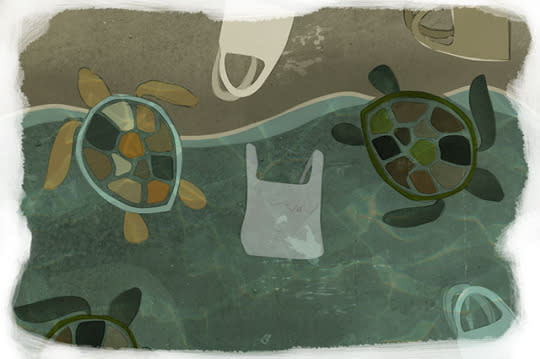
Ditch the plastic bag, save a turtle. (Graphics: Melanie Anderson)
Whether it’s molded into a different shape, sitting in a landfill or destroying a natural habitat, virtually all of the plastic we’ve produced and used is somewhere on the planet. And the environmental effects are disastrous. According to the Plastic Disclosure Project, plastic negatively impacts more than 700 species of birds and animals. A recent study found that more than half of all sea turtles have ingested plastic bags and that almost all of the world’s seabird population will be contaminated with plastics by 2050.
It’s not just marine life that is suffering: According to Environmental Health News, some chemicals found in plastics, which can be absorbed by human bodies, have been found to change human hormones and can even have other negative effects on human health. “The very qualities that make plastic an adaptable and durable product to use also make it an environmental nightmare,” says Nancy Eiring of Surfrider Foundation. Instead, she says, it breaks down with exposure to weather and the sun into smaller and smaller pieces, ultimately ending up in our waterways and our oceans. The best way to change our plastic addiction is to start at the source: reducing everyday use of plastics.
1. Buy in Bulk
Buying from the bulk food bins at the grocery store is not just an environmentally friendly thing to do, it also keeps more money in your wallet. A 2012 report from Portland State University showed how buying in bulk could prevent hundreds of millions of pounds of packaging from going into landfills every year.
Related: 8 Guilt-Free Cleaning Products to Make at Home
In addition, the same report confirms that consumers can save 89 percent of their food budget by buying bulk instead of packaged foods. Not only is there less waste in terms of non-recyclable plastic packaging, but also food manufacturers save money on material and delivery costs in some key categories – savings that are passed along to consumers. Try reusing the plastic bags you get from the bulk sections each time you return to the store before transferring them to non-plastic containers at home.
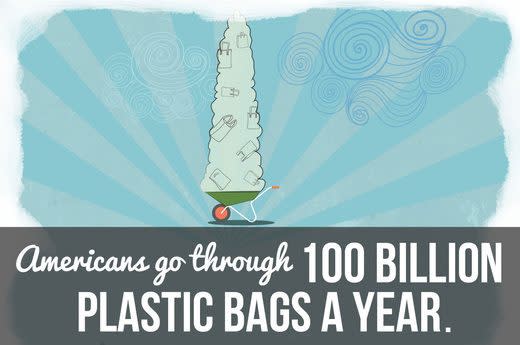
2. Keep Reusable Tote Bags in Your Car
According to Surfrider Foundation, it is estimated that Americans go through about 100 billion plastic bags a year, which works out to 360 bags per year per person. Though these bags are often reused around the house, from trash-can liners to dog-poop bags, the majority end up in landfills, leaching chemicals into our water system. “When it rains, trash on sidewalks and streets accumulates in the gutter and is swept into a city’s storm drain system. Most storm drain systems discharge directly into the nearest waterway, which eventually flows to the ocean,” said Eiring.
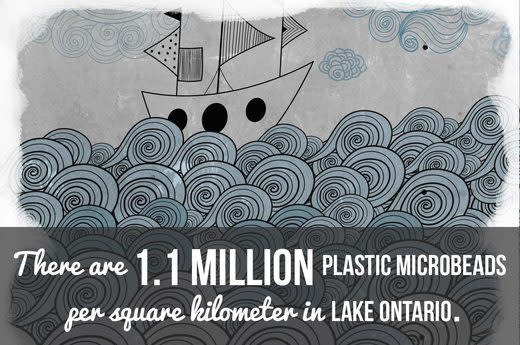
3. Axe Beauty Products With Microbeads
Small plastic beads found in cosmetics are ending up in our waterways. One researcher found 1.1 million of them per square kilometer in Lake Ontario, according to an NPR report. These beads, which soak up toxins, look like food to marine life. So the fish eat them, and then we eat the fish. The best way to get these bits of plastic out of your life is to avoid “polyethylene” or “polypropylene” in common drugstore items like toothpaste, exfoliators and soap.
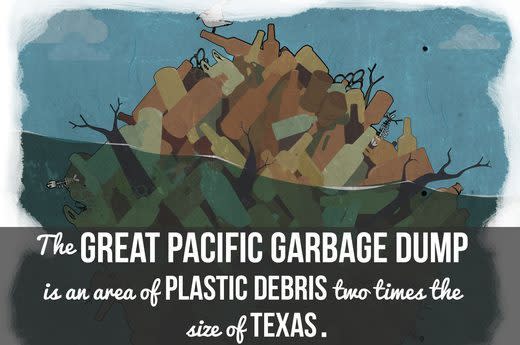
4. Reuse Sandwich Baggies (It’s Worth the Wash)
It’s not just plastic shopping bags that are ending up in sea turtles: Ziploc bags aren’t being recycled either, and they’re a major contributor to the Great Pacific Garbage Patch. “(It) is an area of plastic debris two times the size of Texas where currents converge and collect debris – mainly various types of plastics,” said Nancy Eiring. This debris blocks sunlight from reaching algae and plankton critical to the entire food web of ocean life. Reuse baggies by washing them with soap and cold water, as Mother Jones recommends, in order to avoid any potential chemical leaching into food. Even better: Buy reusable sandwich and snack bags instead.
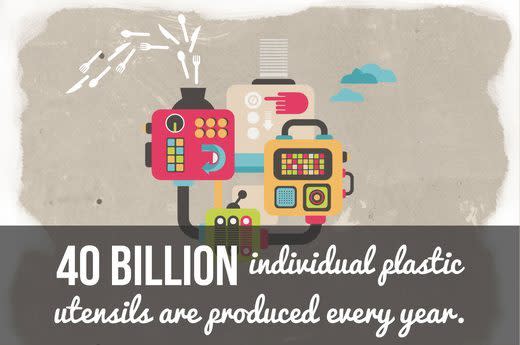
5. Quit Disposable Utensils
In an ideal world we would never have to use disposable utensils. Plastic forks and knives have made take-out lunch easier, plus sample-size spoons have been a boon for ice cream stores everywhere. It’s estimated that 40 billion individual plastic utensils are manufactured each year, and most are not recyclable, according to Whole Foods Magazine. Enter newer compostable forks and knives, made from wood and other plant materials, that will biodegrade naturally. Even better: Think ahead and bring reusable utensils when you are on the go.
Related: How to Detox Your Body Naturally

6. Leave Produce Containers at the Store
When you shop right at the food source, reusing containers becomes easy. If you go to the same farmers market every week, the vendors will be grateful to see those green plastic containers for berries and cherry tomatoes, suggests MyPlasticFreeLife.com. You can do this at a regular grocery store too: After checking out, empty out the produce into your own glass food-storage containers before leaving the store. That way the fruit stays uncrushed by your tote bag, and you can give the plastic directly back to the store to use another time.
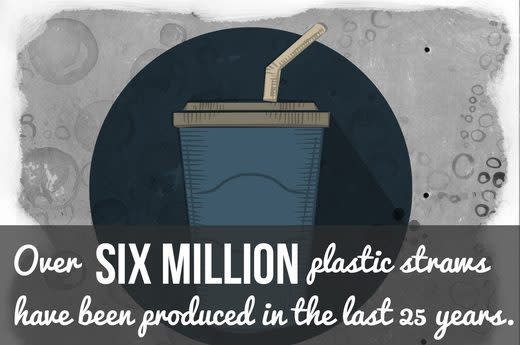
7. Go Straw-Free
Straws are one of the top five things picked up during beach cleanups in coastal communities by Surfrider’s chapter network. And it’s no surprise when you figure that more than 6 million straws have been produced in the past 25 years. The Be Straw-Free project (ChooseToBeStrawFree.com) is trying to change that policy. Started by an 11-year-old boy from Vermont, its focus is on restaurants to adopt his “Offer First” policy, in which vendors offer straws to customers instead of just automatically serving them with all beverages. Follow this advice in your own life to significantly reduce your use of plastics.
The original article “10 Ways to Reduce Your Use of Plastic“ appeared on LIVESTRONG.COM.
By Emily Shetler
More from LIVESTRONG.COM:
9 Feng Shui Tips to Make You Healthier and Happier
5 Simple Steps to Living a Healthier Life
Things to Do Today That You’ll Thank Yourself for Later
